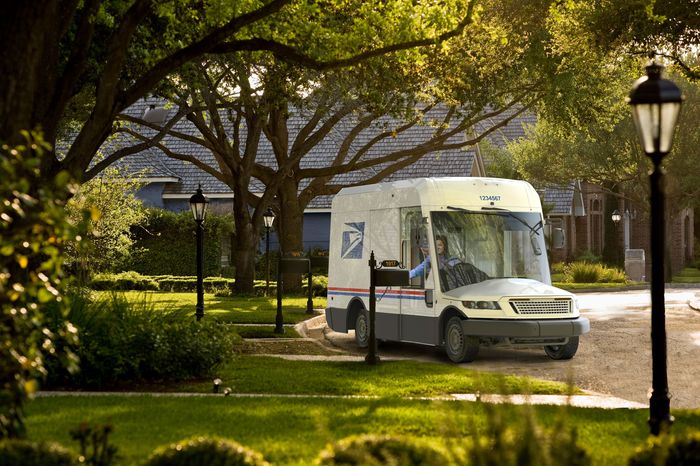
A duck. A modified Popemobile. A Richard Scarry rendering. The Pixar-created star of Cars 5? Over the past 24 hours the internet has exhausted itself creating memes for the United States Postal Service’s new mail-delivery vehicle, which, with its exaggeratedly tall glass cab and stubby extra-low bumper, does look — well, now that you mention it — kind of a lot like a duck. The truck, which is actually more like a minivan, is the first of many different vehicles expected in a next-generation USPS delivery fleet, and it sounds like an absolute winner on paper: the custom-built, steering-wheel-on-the-right model can be outfitted as either electric or gas-powered, and 50,000 to 165,000 of them will be built right here in the U.S. by the Wisconsin-based defense contractor Oshkosh. But the most important benefits will be delivered, if you will, by that goofy-looking design.
Over the last decade, the number of pedestrian fatalities has gone up in the U.S., even as overall traffic deaths have slightly declined. Many safety experts have attributed this to the growing proportion of SUVs and trucks, which now make up 60 percent of the country’s vehicle fleet. They’re taller, heavier, and more powerful than most sedans, and they also have a larger “strike zone,” meaning that when you get hit by one, you’re taking a direct hit to your torso and thus your vital organs. You’re also more likely to be thrown in front of or below the vehicle. The jutting lower lip of this USPS truck, as weird as it looks, is a transformative, life-saving feature. Should you be hit by this (very slow-moving, usually) vehicle, you’ll likely be struck on the legs, throwing you up onto the convex hood, where you’re a lot likelier to roll off to the side instead of under the wheels. You’re almost surely less likely to be killed.
The high-visibility windshield that wraps around the entire cab is another key safety feature. The driver not only sits in what’s essentially a cockpit of glass, but the seat is situated much lower in the vehicle overall. There are nifty sliding side windows, too. All that glass area eliminates another key flaw of taller SUVs and trucks, the “front blind spot.” (For evidence of just how out-of-control this problem is, look how many children can line up at the front of a Cadillac Escalade before the driver can see them.) To compensate for the loss of sight lines, automakers load their SUVs and trucks up with fancy onboard tech features, and the USPS truck is similarly equipped with 360-degree cameras, plus front- and rear-collision avoidance systems. But with this kind of cab design that prioritizes simply making it easier to see, it’s likely that drivers won’t need to rely on the cameras over their own eyes.
As cities face an onslaught of online deliveries — even before the pandemic, it was estimated that one in eight Americans receives an internet purchase every day — the unpredictable movements of delivery vans snarl traffic and block streets, sometimes with fatal consequences. Traditional mail trucks have always been tinier compared to their peers, but this USPS makeover has resulted in what might be the ideal delivery vehicle: compact but with a much bigger cargo space, including an extra large hatch for transporting large parcels. Companies like Amazon need to learn from this downsizing, also known as “rightsizing” vehicle fleets. From smaller fire engines to nimbler garbage trucks, making vehicles better scaled to urban tasks can make a huge difference, not only for keeping other cars moving on narrow streets, but also to ensure that humans on those same streets can access the bike lanes, sidewalks, and curb cuts they need to get around.
As USPS takes the first steps to future-proof its fleet, these little oddball trucks signify a real shift towards a federal government that might itself set new standards for the safer, cleaner, smaller vehicles that city streets need. Just look at the evolution of USPS’s own vehicles, from the 1950s Jeep DJs, to the current aluminum truck that sits on a Chevy S-10 chassis, to the new ride, which looks suspiciously similar to Ford’s Transit minivan body. To transform its own truck required real attention by the USPS about how it might truly revolutionize the way mail moves safely through our neighborhoods. This result speaks directly to the fact that these problems can no longer be solved by the vehicles we’ve driven for the past century. Now, how quickly can that same thinking permeate the rest of the auto industry?
Article From & Read More ( Sure, Laugh Away. But Every Big Vehicle Should Look Like This New USPS Truck - Curbed )https://ift.tt/3qSaMtt
Business

No comments:
Post a Comment